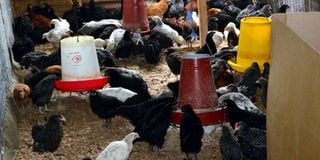How to keep at bay deadly fowl pox disease

Always disinfect farm equipment, drinkers and feeders regularly and seek advice from a veterinarian on the best disinfectant for your production needs to keep away poultry diseases such as fowl pox. FILE PHOTO | NMG
What you need to know:
- Vaccinate your birds against fowl pox.
- Practice all-in, all-out poultry management
- Humans are the biggest threat to the spread of diseases.
- There should be a footbath at the entrance of every poultry house that all visitors should dip their foot wear.
It is a slow spreading viral disease that affects chickens, pigeons, turkeys and other birds. Infected birds may carry the disease for 3-5 weeks before showing any signs.
It is characterised by cutaneous lesions on the featherless parts of the birds’ skin or the diphtheric lesions that are seen on the mucosa of the mouth and respiratory tract.
The disease may occur at any time and it affects birds of all ages. Mortality rate is less in the cutaneous form but high if there is involvement of the respiratory tract.
The disease is transmitted through direct contact with other infected birds, scabs from infected birds that contaminate the environment, through bites from mosquitoes and other biting insects that had previously fed on infected birds or through the airborne transmission.
The disease manifests the following clinical signs:
The cutaneous form:
- Raised crusted lesions (black or white swellings) on the face, eyes, comb and wattles of the birds.
- Reduction and eventually a stop egg production.
- Weight loss.
- Swollen and closed eyelids: Lesions around the eyes may cause eyes to close leading to blindness and death from starvation and thirst.
This form rarely causes death and the birds may recover after about 14 days.
The diphtheric form:
Lesions on the mucosa of the food pipe (oesophagus) and the wind pipe (trachea) that appears white in colour.
These lesions produce mucus and pus that obstruct the wind pipe of the birds’ making it difficult for the infected birds to breath well. The lesions in the mouth are painful and prevent the birds from eating. The birds eventually die from suffocation and hunger.
Treatment
The disease is viral and has no known cure. Call a veterinarian to prescribe the best treatment. The treatment is directed towards management of opportunistic infections that make the problem worse.
You may supplement your birds with Stressmix and Electrosol oral in their drinking water to compensate energy lost due to inability to feed. The birds will not eat due to painful wounds on the mouth’s mucosa but will find it easier to drink water.
Prevention and control
Vaccinate your birds against fowl pox. When you purchase your day-old chicks, ensure that the breeders provide you with a vaccination schedule.
Never vaccinate sick birds. Always supplement your birds with Stressmix in their drinking water during vaccination as it is a stressful event.
Fowl pox is a disease that spreads slowly and also takes time to manifest following infection, so it is important that you isolate any new birds that are introduced into the farm for at least three weeks.
Ensure that there is an isolation unit as far as possible from the resident birds. And observe the new birds regularly for any signs of disease and treat if need be.
Practising all-in, all-out poultry management
Control insect population where the birds are as they also spread fowl pox.
Keep wild birds away as they spread diseases into the farm through their droppings or secretions. You can keep them out by placing wire nets and avoiding spillage of feeds outside the poultry house.
Humans are the biggest threat to the spread of diseases. Humans transfer diseases through their clothing, shoes, hands, equipment and vehicles. Every farmer should control the number of people that come into the farm.
All visitors should have their cars and shoes disinfected at the entrance into the farm. Everyone should wash their hands with a disinfectant and wear protective clothing - a dust coat and gumboots before they enter into the poultry house.
There should be a footbath at the entrance of every poultry house that all visitors should dip their foot wear.
Disinfect farm equipment, drinkers and feeders regularly and seek advice from a veterinarian on the best disinfectant for your production needs.
Dr Muchibi is the Animal Health Manager, Elgon Kenya Ltd





